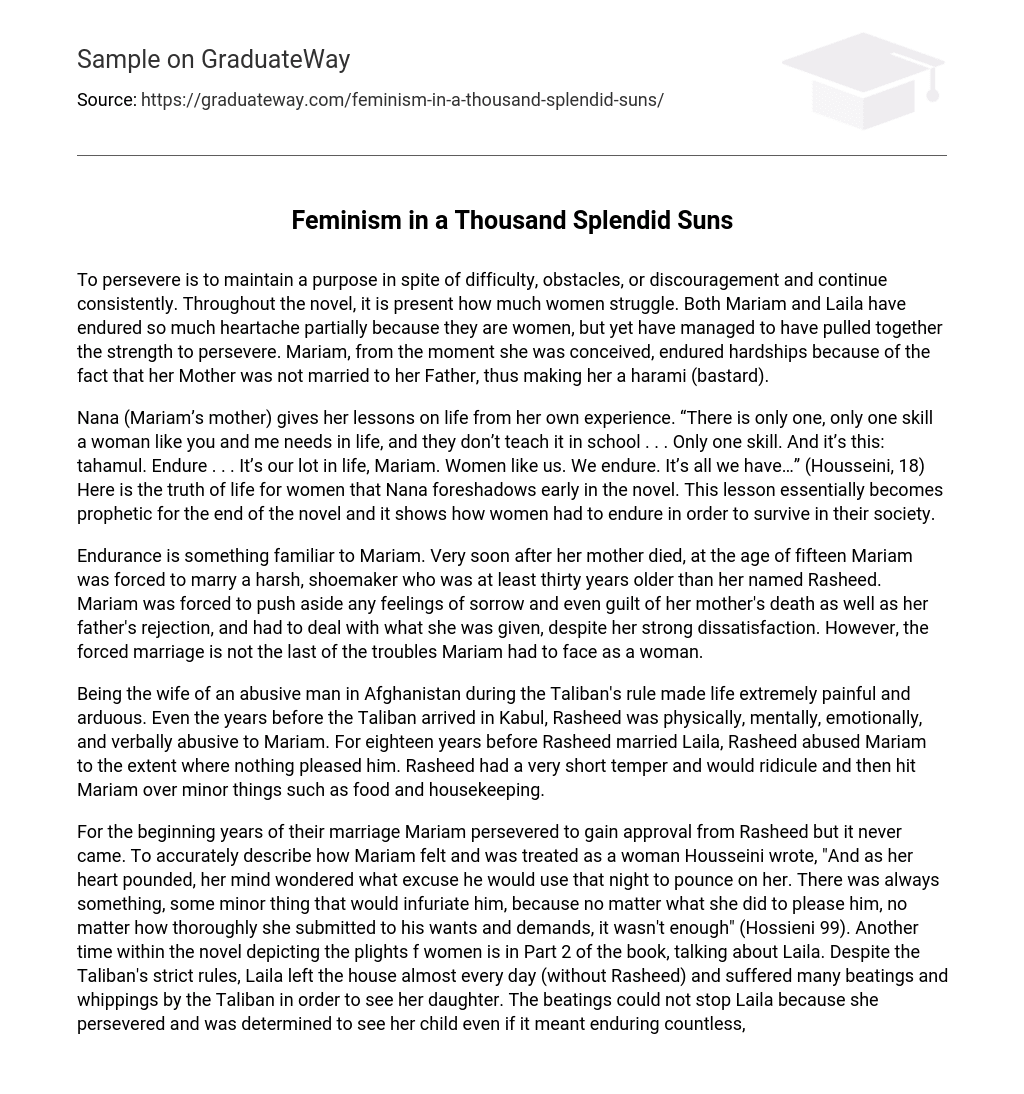To persevere is to maintain a purpose in spite of difficulty, obstacles, or discouragement and continue consistently. Throughout the novel, it is present how much women struggle. Both Mariam and Laila have endured so much heartache partially because they are women, but yet have managed to have pulled together the strength to persevere. Mariam, from the moment she was conceived, endured hardships because of the fact that her Mother was not married to her Father, thus making her a harami (bastard).
Nana (Mariam’s mother) gives her lessons on life from her own experience. “There is only one, only one skill a woman like you and me needs in life, and they don’t teach it in school . . . Only one skill. And it’s this: tahamul. Endure . . . It’s our lot in life, Mariam. Women like us. We endure. It’s all we have…” (Housseini, 18) Here is the truth of life for women that Nana foreshadows early in the novel. This lesson essentially becomes prophetic for the end of the novel and it shows how women had to endure in order to survive in their society.
Endurance is something familiar to Mariam. Very soon after her mother died, at the age of fifteen Mariam was forced to marry a harsh, shoemaker who was at least thirty years older than her named Rasheed. Mariam was forced to push aside any feelings of sorrow and even guilt of her mother’s death as well as her father’s rejection, and had to deal with what she was given, despite her strong dissatisfaction. However, the forced marriage is not the last of the troubles Mariam had to face as a woman.
Being the wife of an abusive man in Afghanistan during the Taliban’s rule made life extremely painful and arduous. Even the years before the Taliban arrived in Kabul, Rasheed was physically, mentally, emotionally, and verbally abusive to Mariam. For eighteen years before Rasheed married Laila, Rasheed abused Mariam to the extent where nothing pleased him. Rasheed had a very short temper and would ridicule and then hit Mariam over minor things such as food and housekeeping.
For the beginning years of their marriage Mariam persevered to gain approval from Rasheed but it never came. To accurately describe how Mariam felt and was treated as a woman Housseini wrote, “And as her heart pounded, her mind wondered what excuse he would use that night to pounce on her. There was always something, some minor thing that would infuriate him, because no matter what she did to please him, no matter how thoroughly she submitted to his wants and demands, it wasn’t enough” (Hossieni 99). Another time within the novel depicting the plights f women is in Part 2 of the book, talking about Laila. Despite the Taliban’s strict rules, Laila left the house almost every day (without Rasheed) and suffered many beatings and whippings by the Taliban in order to see her daughter. The beatings could not stop Laila because she persevered and was determined to see her child even if it meant enduring countless, brutal beatings. “Laila never would have believed that a human body could withstand this much beating, this viciously, this regularly, and keep functioning” (Housseini).
Laila’s ability to withstand the beatings shows how she was able to persevere and that is why she was able to last so long in her marriage and in Afghanistan. Until Laila became a part of the family and the two became friends, Mariam endured Rasheed’s abuse because it was the only option she had. Even though Mariam and Laila are years apart by age, and come from two different life styles, they are both forced to marry Rasheed. Mariam and Laila eventually learn to cooperate as they undergo Rasheed’s emotional and physical abuse, and the rules set out for women in Afghanistan.





